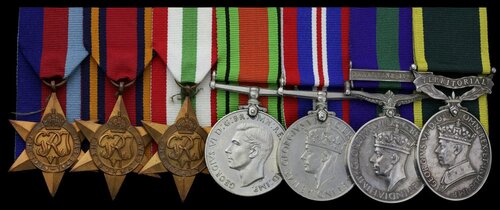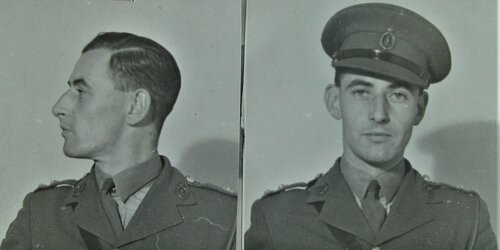Auction: 20003 - Orders, Decorations and Medals
Lot: 453
The campaign group of seven awarded to Major G. A. Cuppleditch, Special Operations Executive and Royal Signals, who served with Forces 133, 266 & 136 - an experience and skilled signalman, he was charged with overall signal command of his units
1939-45 Star; Burma Star; Italy Star; Defence and War Medals 1939-45; General Service 1918-62, 1 clasp, Palestine 1945-48 (Capt. G. A. Cuppleditch. R. Sigs.); Efficiency Medal, G.VI.R., Territorial (Capt. G. A. Cuppleditch. R. Sigs.), mounted court-style as worn by Toye, Kenning & Spencer, good very fine (7)
George Alfred Cuppleditch was born on 27 May 1917 at Kirton, Boston, Lincolnsire, the son of Alfred Edward Cuppleditch. Educated privately, he entered the Post Office (Postal and Telephones) in 1934, before becoming a telecommunications and radio specialist based at Alford, Lincolnshire. With his knowledge of radio communications Cuppleditch joined the Royal Signals in September 1939, becoming a Lance-Corpoal Instructor based in Hounslow and Cambridge. In 1941 he was a Corporal in command of a tele-op section and recommended for commission and in March 1942 commissioned as 2nd Lieutenant into the 55th (West Lancashire) Infantry Division, who were defending the Sussex Coast in June 1943.
In May 1943 he underwent specialist training as a Beach Signalling Officer at the Combined Operations School at Dundonald in Troon, Ayrshire. This was the brainchild of Mountbatten and signalling procedures were developed, taught and put into practice in communications training exercises to and from landing craft. These were designed to assist small landing craft find their way to designated landing places on hostile beaches.
After serving at home Cuppleditch clearly had a thirst for action and applied for the roll for communications specialists in 'dangerous work'. His talent in communications were clearly recognised when in September 1943 he was accepted following interview with the Special Operations Executive SO2.
The organisation of SOE continually evolved and changed during the war. Initially, it consisted of three broad departments: SO1 (propaganda); SO2 (operations); and SO3 (research). SO3 was quickly overloaded with paperwork and was merged into SO2. Radio communication was a vital part of the work of the SOE as most of the resistance networks which SOE formed or liaised with were controlled by radio directly from Britain or one of SOE's subsidiary headquarters. All resistance circuits contained at least one wireless operator, and all drops or landings were arranged by radio, except for some early exploratory missions sent "blind" into enemy-occupied territory.
Cuppleditch was first posted to the Middle East in August 1943 as Staff Officer III (Radio) at Force 133, SOE HQ in Cairo. This was responsible for running operations across the whole Mediterranean, including Greece, Albania, Yugoslavia and Italy, as well as into North Africa, including Tunisia.
He then transferred for the next year to Force 266 at Bari, Italy from December 1943-December 1944. This was responsible for coordinating agents in the Balkans, including Yugoslavia and Albania. Cuppleditch himself was responsible for the entire Singals Planning for the unit, also communicating with O.S.S. and other units.
Returned home to HQ Special Forces, Baker Street, his final assignment was to the Far East from May-October 1945 as Signals Officer with Force 136 based at Rangoon, Burma. He was before promoted to Major in command of an Independent Signals Unit at Calcutta, India.
Following the end of hostilities, Cuppleditch was commissioned into the Regular Army with the substantive rank of Captain (S.O III) and served in Palestine from May 1947-March 1948 (Medal & clasp).
After leaving the Army Cuppleditch continued in the field of telecommunication, eventually becoming Senior Controller of Posts in Hong Kong. After leaving the Civil Service he took up the position of Sales Manager of Western Radio and retired to Louth, becoming Mayor in 1978. A member of the British Institute of Radio Engineers and the elite Special Forces Club, Kensington, he died in August 1994; sold together with named boxes of issue for the last two Medals and his Special Operations Executive file.
For the Medals of his father, please see Lot 409.
Subject to 20% VAT on Buyer’s Premium. For more information please view Terms and Conditions for Buyers.
Sold for
£800
Starting price
£450







